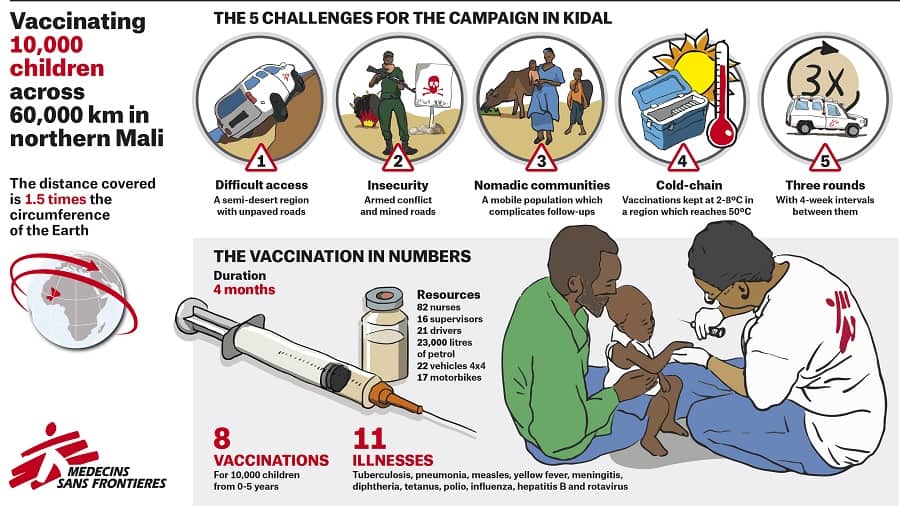The vast, desert region of Kidal in northern Mali, south of the Sahara, is home to nomadic populations frequently living far from health facilities. In 2018, Doctors Without Borders/Médecins Sans Frontières (MSF) launched its first multi-antigen campaign in Mali, aiming to vaccinate 10,000 children against a variety of common illnesses.
Being vaccinated against diseases like diphtheria, measles, whooping cough, meningitis, pneumonia, yellow fever, and other potentially fatal illnesses is a commonplace event for many children. But in northern Mali, where a combination of insecurity, isolation, and limited health infrastructure means that many communities cannot access health facilities, it can prove difficult to protect children against these illnesses.
In its existing projects in the region, ongoing since 2015, MSF staff had begun to notice that many children had not been immunized against common illnesses for several years. As a result, and in partnership with the Ministry of Health and local authorities, MSF launched the campaign seeking to protect the most vulnerable against these life-threatening and debilitating diseases. In January 2018, MSF began its first multi-antigen campaign to vaccinate 10,000 children between the ages of 0 and 5 years.
But the campaign, which involves covering a total of 60,000km of desert roads to reach the number of children targeted, is complicated to implement.
“Bringing this campaign about requires a lot of resources. Before anything else, you have to make the vaccines available, and then get logistics support to move teams around a vast region where access to isolated populations is complicated,” says Patrick Irenge, Medical Coordinator for MSF in Mali. “Vaccines have to be kept at a temperature of between 2 and 8 degrees in a region where temperatures can reach up to 50 degrees Celsius. On top of that, mobilizing so many people – from qualified medical personnel to drivers who know the region perfectly – is no mean feat.”
The campaign will take place in three stages in order to follow the established vaccination calendar in Mali. Measles, yellow fever, and meningitis vaccines need only be administered once to take effect. Others must be delivered in three separate dosages. Such a process can be all the more difficult to follow given the nature of mobile, nomadic communities which do not always stay in one location over a period of weeks.

“That poses an access problem for the vaccination activities,” continues Patrick. “But vaccination is an efficient preventative measure which protects the most vulnerable.”
MSF has now completed two stages of the vaccination campaign, and will complete the campaign by the beginning of May.
MSF has been present in Mali since 1985, and first provided medical assistance to the people of Kidal between 1998 and 2008, with a maternal health project. The organization returned to Kidal in 2015 with the aim of ensuring access to healthcare for isolated communities, especially women and young children. MSF teams are also working in the districts of Ansongo (Gao region), Koutiala (Sikasso region), Tenenkou and Douentza (Mopti region), notably by strengthening the provision of maternal and paediatric care.












